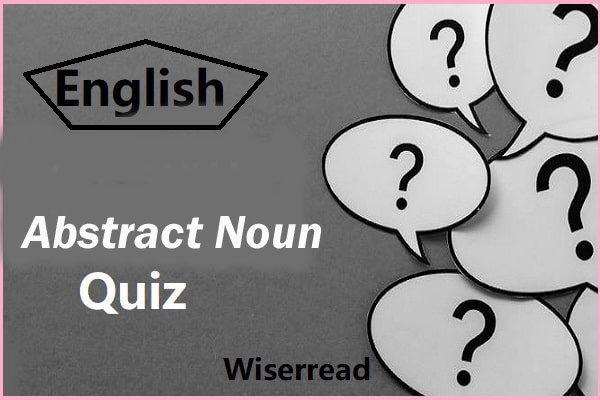Welcome to the Abstract Noun Quiz. Abstract nouns are fascinating concepts that represent ideas, qualities, or conditions rather than tangible objects. They encompass emotions like “happiness” and “fear,” states such as “freedom” and “confusion,” and qualities like “bravery” and “wisdom.”.
Understanding abstract nouns not only enriches your vocabulary but also enhances your ability to express complex thoughts.
You’ll have the opportunity to test your knowledge, identify abstract nouns in various contexts, and deepen your grasp of language. Whether you’re a student honing your skills, let’s embark on this engaging journey to explore the world of abstract nouns.
Abstract Noun Quiz
Let’s click the “start” button to open the quiz and participate in clearing your concept about Abstract nouns.
Try to give another quiz test: Collective Noun quiz
Top 20 Adverbs Quiz with Answers
Interjections Quiz with Answers
Exercise on Abstract Noun quiz
1. What is An abstract noun?
a. It is a noun that refers to feelings, concepts, ideals, and qualities.
b. A noun is a noun that refers to some sort of group or collective—of people, animals, things, etc.
c. A noun that refers to something that physically exists; i.e., it is something you can perceive with one of your five senses.
2. Select the abstract noun.
a. Freedom
b. Bubble
c. Door
3. Select the non-abstract noun (i.e., the concrete noun).
a. Love
b. Woman
c. Happy
5. Select the abstract noun.
a. Garden
b. Hate
c. Paper
6. Select the abstract noun.
a. Cries
b. Convent
c. Courage
7. Select the abstract noun.
a. Cold
b. hot
c. Friendship
8. Select the abstract noun.
a. Contemp
b. Marker Pen
c. Cry
9. Select the sentence with an abstract noun.
a. You do not need a parachute to skydive. You only need a parachute to skydive twice.
b. Peace begins with a smile
c. Life is full of misery.
10. Select the abstract noun.
a. Brave
b. Strong
c. Inspire
10. Which of the following is an abstract noun?
A) Dog
B) Relationship
C) Chair
11. Love is an Abstract noun: is it correct?
a. True
b. False
12. What is the abstract noun form of the adjective “brave”?
A) Bravery
B) Braveness
C) Bravehood
13. Which of these words is NOT an abstract noun?
A) Happiness
B) Anger
C) Love
D) Apple
14. Which sentence uses “justice” as an abstract noun?
A) The justice was served in court.
B) They discussed justice and fairness.
C) She is a justice of the peace.
15. Choose the abstract noun from the following options
A) Mountain
B) Sorrow
C) Tree
16. What is the abstract noun form of “wise”?
A) Wisdom
B) Wisely
C) Wisehood
17. In which of these sentences is “truth” an abstract noun?
A) The truth was hard to accept.
B) He told the truth.
C) She spoke the truth.
D) All of the above.
18. Which of the following words represents an abstract noun?
A) Teacher
B) Knowledge
C) Building
19. What is the abstract noun for the verb “to create”?
A) Creativity
B) Creation
C) Creator
20. “Teacher” is an abstract noun.
a. True
b. False
All of the questions answer
- a. It is a noun that refers to feelings, concepts, ideals, and qualities.
- a. Freedom
- b. Woman
- b. Hate
- c. Courage
- c. Friendship
- a. Contemp
- b. Peace begins with a smile
- c. Inspire
- B) Relationship
- a. True
- A) Bravery
- D) Apple
- B) They discussed justice and fairness.
- B) Sorrow
- A) Wisdom
- D) All of the above.
- B) Knowledge
- B) Creation
- b. False
Read also more related topics: Countable and Uncountable Nouns
FAQs on Abstract Nouns
What is an abstract noun, and how does it differ from concrete nouns?
An abstract noun refers to concepts, qualities, or ideas that cannot be perceived through the five senses. Examples include “freedom,” “happiness,” and “bravery.” In contrast, concrete nouns denote physical objects that can be seen or touched, such as “apple,” “car,” or “building.”
Can you provide examples of abstract nouns in everyday language?
Absolutely! Common abstract nouns include “love,” “fear,” “success,” “justice,” and “honesty.” These words represent feelings, states, or qualities rather than tangible items.
What are the different types of nouns, and how do they categorize abstract nouns?
There are many types of Noun. Nouns can be categorized including:
- Concrete Nouns: Physical objects (e.g., “dog,” “book”).
- Abstract Nouns: Ideas and qualities (e.g., “beauty,” “anger”).
- Collective Nouns: Groups of people or things (e.g., “team,” “flock”).
- Proper Nouns: Specific names (e.g., “London,” “Sarah”).
- Abstract nouns specifically fall under the category of nouns that represent intangible concepts.
Are all feelings considered abstract nouns?
Yes, most feelings are classified as abstract nouns. Words like “joy,” “sadness,” “fear,” and “anger” are all abstract nouns because they describe emotional states rather than physical objects.
How can I identify abstract nouns in a sentence?
To identify abstract nouns in a sentence, look for words that express concepts, qualities, or states of being. They often answer questions like “What?” or “How?” For example, in the sentence “Her kindness was appreciated,” “kindness” is the abstract noun.
Can abstract nouns be used in different forms, and how?
Yes, abstract nouns can often be derived from adjectives or verbs. For instance, the adjective “happy” becomes the abstract noun “happiness,” and the verb “decide” transforms into “decision.” This flexibility allows for varied expression of ideas and qualities in language.

